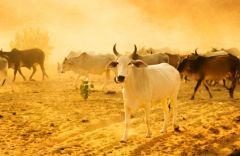
 |
| Cows grazing in the desert of Rajasthan, India. (Copyright: szefei via 123rf) |
Selangor, Malaysia, Nov 12, 2016 - (ACN Newswire) - Management and nutritional strategies are needed to protect livestock from heat stress resulting from climate change, according to a review paper published in the Pertanika Journal of Tropical Agricultural Science.
Safe and cost-effective animal protein will be vital to food security as the human population grows to an expected 11.2 billion by the year 2100. With climate change already having visible impacts, it is important to understand how it will affect the general health of livestock.
Dr Veerasamy Sejian from India's ICAR-National Institute of Animal Nutrition and Physiology and colleagues reviewed the latest research on the effects of heat stress on livestock immunity. Livestock immune functions are either suppressed or enhanced, depending on the length of exposure to heat stress.
Heat stress mainly affects the immune system through three endocrine glands: the hypothalamus and pituitary glands located in the brain, and the adrenal glands located above the kidneys. Activation of the hypothalamo-pituitary-adrenal axis leads to the secretion of hormones that affect various components of the immune system. Stress also impacts the system responsible for what is known as the flight-or-fright response. This system, called the sympathetic-adrenal-medullary system, acts by releasing chemicals that enhance the breakdown of glycogen, increasing blood glucose levels so the body can meet its higher stress-induced energy requirements.
Generally, activation of these two systems alters animals' immune functions, affecting the integrity of protective barriers and the response of immune cells to attacking pathogens.
Heat stress also impacts critical events in the life cycle of livestock, including the passive transfer of maternal antibodies to offspring via milk and developing an effective response to vaccination.
Effective management of animal shelters and providing evaporative cooling systems can play an important role in reducing the effects of heat on livestock. Rearing livestock that are selected for their heat tolerant genes can also form an effective protective strategy.
Recent research has shown that modifying livestock nutrition can be an effective approach to manage the impacts of heat stress. Vitamin A and zinc supplements, for example, can help maintain protective barriers against pathogens in the gut and udders. Combined supplements of selenium and vitamin E can positively influence the ability of white blood cells to attack pathogens. Iron can also play an important role in promoting the development of immune-related glands.
Another important protective strategy involves the naturally occurring bacteria present in the guts. Prebiotics are indigestible ingredients that stimulate the growth and activity of gut bacteria. When gut bacteria are healthy, they compete against invading bacteria for food, preventing the invaders from flourishing. Probiotics are mixtures of live microorganisms that are beneficial to animal health. These line the gut, strengthening its mechanical barrier. They also compete with pathogenic bacteria, making it more difficult for them to survive.
The team's review could serve as a useful reference material for researchers aiming to improve livestock production in a changing climate scenario by means of optimizing livestock immune systems, the researchers conclude.
For more information about this research, please contact:
Dr Veerasamy Sejian
Senior Scientist, Animal Physiology Division
ICAR-National Institute of Animal Nutrition and Physiology
Adugodi, Bangalore-560030, India
Email: drseijian@gmail.com
Tel: +91 9,108,025,711,420; Mobile: +91 9,740,726,121
About Pertanika Journal of Tropical Agricultural Science (JTAS)
Pertanika Journal of Tropical Agricultural Science (JTAS) is published by Universiti Putra Malaysia in English and is open to authors around the world regardless of nationality. Beginning 2012, it would be published four times a year in February, May, August and November. Other Pertanika series include Pertanika Journal of Science & Technology (JST), and Pertanika Journal of Social Sciences & Humanities (JSSH).
JTAS aims to provide a forum for high quality research related to tropical agricultural research. Areas relevant to the scope of the journal include: agricultural biotechnology, biochemistry, biology, ecology, fisheries, forestry, food sciences, entomology, genetics, microbiology, pathology and management, physiology, plant and animal sciences, production of plants and animals of economic importance, and veterinary medicine. The journal publishes original academic articles dealing with research on issues of worldwide relevance.
Website: http://www.pertanika.upm.edu.my/
The paper is available from this link: http://bit.ly/2fJbunT
For more information about the journal, contact:
The Chief Executive Editor (UPM Journals)
Head, Journal Division, UPM Press
Office of the Deputy Vice Chancellor (R&I)
IDEA Tower 2, UPM-MDTC Technology Centre
Universiti Putra Malaysia
43400 Serdang, Selangor
Malaysia.
Phone: +603 8947 1622 | +6016 217 4050
Email: nayan@upm.my
Press release distributed by ResearchSEA for Pertanika Journal.
Source: Pertanika Journal
Copyright 2016 ACN Newswire . All rights reserved.
© 2016 JCN Newswire
